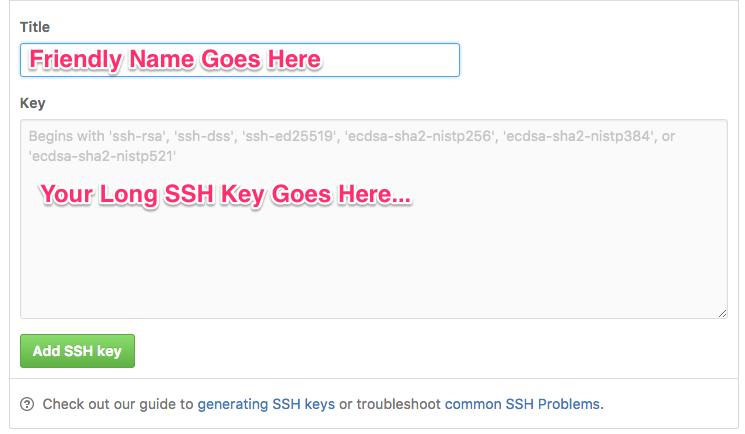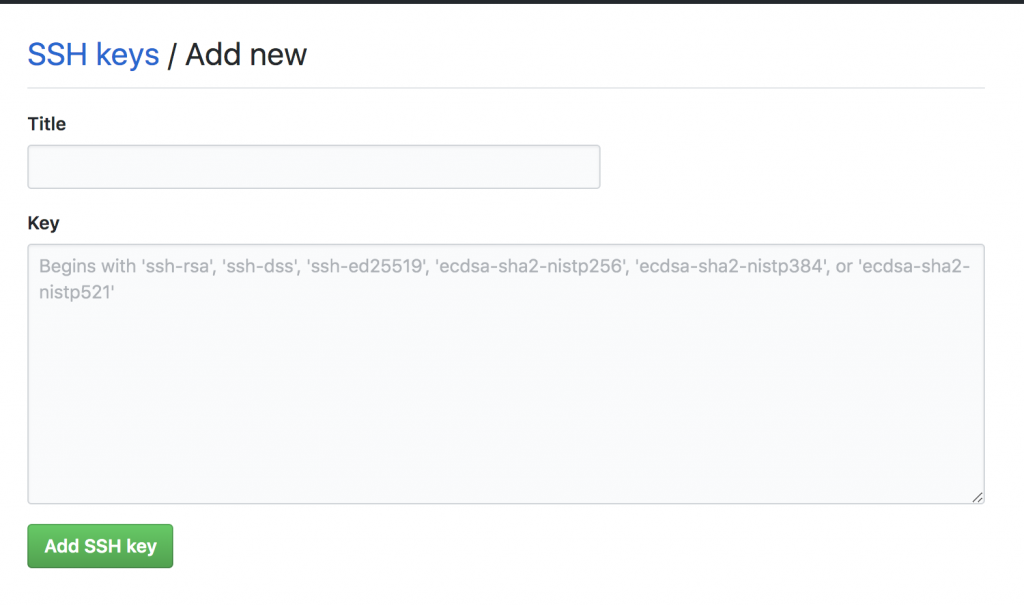Github Generate New Ssh Key
- Ssh For Github
- Github Generate Ssh Key Osx
- Github Generate New Ssh Keyboard
- Github Generate New Ssh Key Manager
Generating a new SSH key and adding it to the ssh-agent Mac Windows Linux All After you've checked for existing SSH keys, you can generate a new SSH key to use for authentication, then add it to the ssh-agent. If you don't already have an SSH key, you must generate a new SSH key.
Jul 19, 2019 $ ssh-keygen -t rsa -b 4096 -C 'me@myemail.com' # Creates a new ssh key, using the provided email as a label Generating public/private rsa key pair. Enter a file in which you want to save your keys. You can press enter and the default /.ssh/idrsa will be used. Enter a file in which to save the key (/Users/you/.ssh/idrsa): Press enter. Mar 02, 2018 Say the new ssh-key was named “workrsa”, now copy the content of the newly generated public key file (workrsa.pub in this example) and paste it to the work GitHub account’s setting page as.
This version of GitHub Enterprise will be discontinued on This version of GitHub Enterprise was discontinued on 2019-03-27. No patch releases will be made, even for critical security issues. For better performance, improved security, and new features, upgrade to the latest version of GitHub Enterprise.For help with the upgrade, contact GitHub Enterprise support.
After you've checked for existing SSH keys, you can generate a new SSH key to use for authentication, then add it to the ssh-agent.
If you don't already have an SSH key, you must generate a new SSH key. If you're unsure whether you already have an SSH key, check for existing keys.
If you don't want to reenter your passphrase every time you use your SSH key, you can add your key to the SSH agent, which manages your SSH keys and remembers your passphrase.

Generating a new SSH key
Open TerminalTerminalGit Bashthe terminal.
Paste the text below, substituting in your GitHub Enterprise email address.
This creates a new ssh key, using the provided email as a label.
When you're prompted to 'Enter a file in which to save the key,' press Enter. This accepts the default file location.
At the prompt, type a secure passphrase. For more information, see 'Working with SSH key passphrases'.

Adding your SSH key to the ssh-agent
Before adding a new SSH key to the ssh-agent to manage your keys, you should have checked for existing SSH keys and generated a new SSH key. When adding your SSH key to the agent, use the default macOS ssh-add command, and not an application installed by macports, homebrew, or some other external source.
Start the ssh-agent in the background.
If you're using macOS Sierra 10.12.2 or later, you will need to modify your
~/.ssh/configfile to automatically load keys into the ssh-agent and store passphrases in your keychain.Add your SSH private key to the ssh-agent and store your passphrase in the keychain. If you created your key with a different name, or if you are adding an existing key that has a different name, replace id_rsa in the command with the name of your private key file.
Note: The
-Koption is Apple's standard version ofssh-add, which stores the passphrase in your keychain for you when you add an ssh key to the ssh-agent.If you don't have Apple's standard version installed, you may receive an error. For more information on resolving this error, see 'Error: ssh-add: illegal option -- K.'
Add the SSH key to your GitHub account.
Ssh For Github
If you have GitHub Desktop installed, you can use it to clone repositories and not deal with SSH keys. It also comes with the Git Bash tool, which is the preferred way of running git commands on Windows.
Ensure the ssh-agent is running:
- If you are using the Git Shell that's installed with GitHub Desktop, the ssh-agent should be running.
If you are using another terminal prompt, such as Git for Windows, you can use the 'Auto-launching the ssh-agent' instructions in 'Working with SSH key passphrases', or start it manually:
Add your SSH private key to the ssh-agent. If you created your key with a different name, or if you are adding an existing key that has a different name, replace id_rsa in the command with the name of your private key file.
Add the SSH key to your GitHub account.
Generate an ssh key linux. Mar 22, 2019 Creating a Key pair Open your terminal and run the following command under your username. local$ ssh-keygen -t rsa. The prompt defaults to save the new key pair in the /home/username/.ssh/ directory. It's recommended that you do not use a passphrase. Click Enter on your keyboard to continue.
Github Generate Ssh Key Osx
Start the ssh-agent in the background.
Add your SSH private key to the ssh-agent. If you created your key with a different name, or if you are adding an existing key that has a different name, replace id_rsa in the command with the name of your private key file.
Add the SSH key to your GitHub account.
Github Generate New Ssh Keyboard
Start the ssh-agent in the background.
Add your SSH private key to the ssh-agent. If you created your key with a different name, or if you are adding an existing key that has a different name, replace id_rsa in the command with the name of your private key file.
Add the SSH key to your GitHub account.
Further reading
Github Generate New Ssh Key Manager
- 'About SSH'
- 'Working with SSH key passphrases'